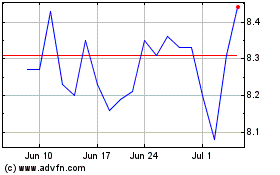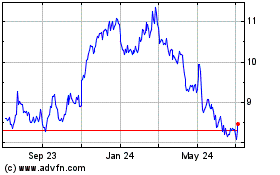Telefonica, PT Coax Investors As Battle For Vivo Hots Up
May 24 2010 - 9:24AM
Dow Jones News
Telefonica SA (TEF) will this week press major investors to
accept its offer for Portugal Telecom's stake in Vivo Participacoes
SA (VIV), intensifying the battle for control of the Brazilian
mobile operator.
Wednesday, Telefonica will begin a roadshow to pursuade major PT
shareholders--including stepping up pressure on U.S. investors
Brandes Funds and Blackrock Inc. (BLK)--to back its EUR5.7 billion
bid for control of Vivo, people familiar with the situation say.
The move is seen as key to the Spanish telecom giant's efforts to
increase scale and unlock synergies in the fast-growth Brazilian
communications segment.
Portugal Telecom has so far rejected the offer and Portuguese
Prime Minister Jose Socrates described the company as a strategic
asset, and Brazil as a key market.
To argue its case and pressure Portugal Telecom's shareholders,
Telefonica has hired Swiss investment bank UBS AG (UBS) and is also
being helped by long-term adviser Credit Suisse Group (CS), people
familiar with the matter say.
Advisors will focus particularly on U.S. shareholders, such as
Brandes and BlackRock, people familiar with the matter say. San
Diego, Calif.-based Brandes, which owns just over 9% of the equity
in Portugal Telecom, could potentially play a pivotal deciding
role. Brandes couldn't immediately be reached to comment on the
issue. Blackrock, with a 2.3% stake, couldn't immediately be
reached.
"Telefonica is trying to get across to PT's shareholders that if
they aren't convinced by the PT growth story for Vivo now, there is
an opportunity to crystalize value," one person close to the
situation says.
Telefonica, which also has a 10% stake in Portugal Telcom, could
call an extraordinary shareholder meeting, but these people say its
preferred strategy is to push for another shareholder to do so.
Telefonica's bid earlier this month has wreaked irrevocable
damage to an already fragile relationship between the two
companies, one person says, meaning there is now no way back for
either of them.
"Telefonica's bid for Vivo has soured their relationship,
something will have to change because they won't be able to go back
to the status quo now."
Another person said the battle was now likely to become "a long
drawn-out and ugly thing."
For both companies, Vivo is a key asset. Vivo represented
roughly half of Portugal Telecom's revenue in the first quarter in
the only area that had growth in the period. The Portuguese firm
has said Vivo is a core part of its business and that leaving
Brazil would threaten its long-term growth prospects.
Telefonica, meanwhile, wants to merge Vivo with its Brazilian
fixed line operator Telecomunicacoes de Sao Paulo (TLPP4.BR), or
Telesp, to increase its scale in Brazil and unlock EUR2.8 billion
in synergies.
Last week, Portugal Telecom began a roadshow of its own in
California and the east cost of the U.S., as it scrambled to
reassure investors about its own strategy in Brazil.
To help defend itself from the unsolicited bid, Portugal Telecom
has hired Bank of America-Merrill Lynch (BAC), other people
involved say. PT declined to comment.
Telefonica and Portugal Telecom face declining revenue in their
mature home markets and the lingering impact of severe recession,
making them increasingly dependent for growth on countries like
Brazil, where mobile penetration rates are still low enough to pick
up new wireless and Internet customers. Brazil had 180.8 million
cellphone subscribers in April, an equivalent of 94% of the
population, and added 1.66 million subscribers in the month.
May 11, Telefonica bid EUR5.7 billion for Portugal Telecom's
stake in Brasilcel, a holding company both companies share that
controls Vivo. The joint venture has existed since 2001, but each
company has previously sought to buy the other's stake.
Friday, ING said in a note that Telefonica should be willing to
pay up to EUR7.5 billion for the Vivo stake due to the synergies,
potential tax credits and gains the company could make after
selling its stake in PT--a stake it is unlikely to keep should it
acquire the company's prized asset.
Telefonica in November lost out to France's Vivendi SA (VIV.FR)
in a bidding war for Brazilian alternative telecoms provider GVT,
spurring its latest bid for Vivo. Brazil has also been pushed to
the forefront of Telefonica's strategy in the region after
Venezuela devalued the bolivar and currency controls in the country
hurt its revenue there.
Vivo has the biggest mobile market share in Brazil, but rivals
are close behind; Claro--the local unit of Carlos Slim's America
Movil SA (AMX)--Oi, owned by holding company Telemar Norte Leste
(TMAR5.BR) and the country's largest telco, and Telecom Italia
SpA's (TI) TIM Participacoes (TSU) are all moving to offer combined
fixed-line, Internet, television and cellphone services to expand
their grip on the market.
-By Jason Sinclair and Jessica Hodgson, Dow Jones Newswires, +34
91 395 81 27, jason.sinclair@dowjones.com (Christopher Bjork
contributed to this story.)
Telefonica Brasil (NYSE:VIV)
Historical Stock Chart
From Apr 2024 to May 2024

Telefonica Brasil (NYSE:VIV)
Historical Stock Chart
From May 2023 to May 2024
